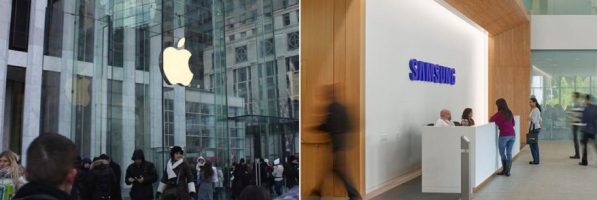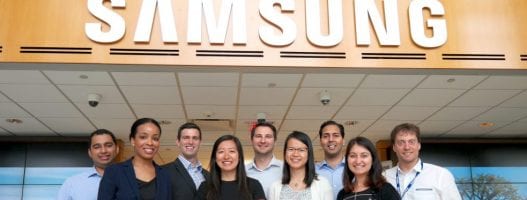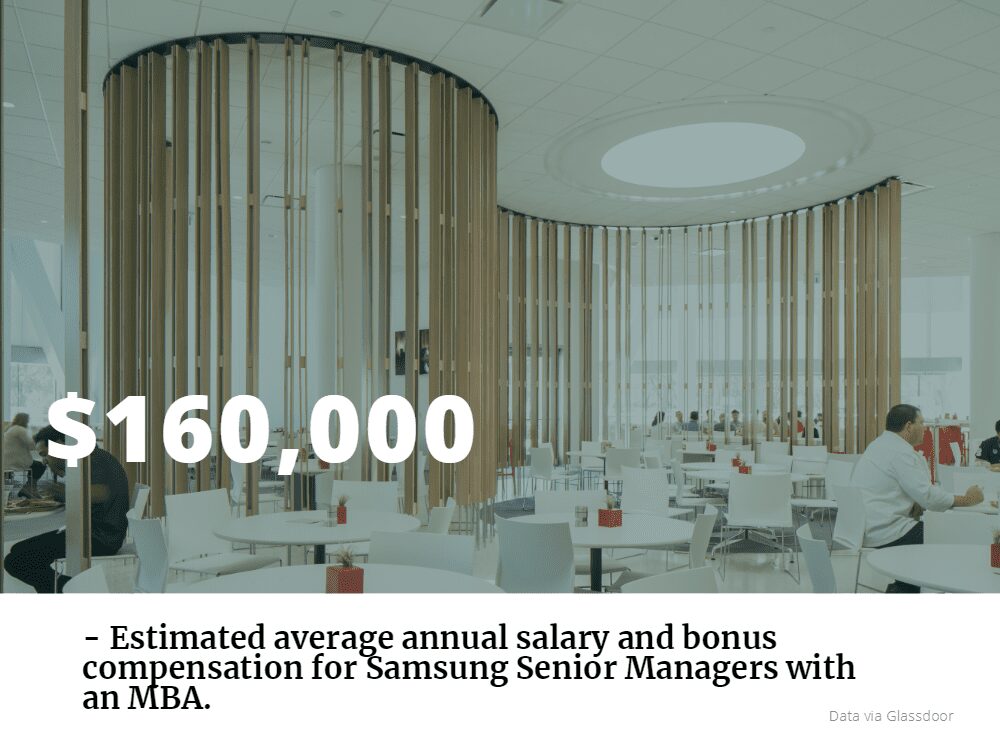Where Should I Work: Apple vs. Samsung

Apple and Samsung are two of the premiere mobile phone and technology companies in the world. But from the outside, it may be tough to gauge what sets them apart as employers.
Continue reading…Top MBA Recruiters: Samsung

With Vision 2020 goals that include $400 billion in revenue via VR technology, the implementation of 5G, and biotech, Samsung is one of the most desirable companies for MBAs who want to advance their careers at the intersection of business and tech. Along with a strong recruitment record from top programs for interns, a potential Samsung career also offers recent MBA grads competitive starting pay.
Samsung Career and Internship Opportunities
Samsung’s Global Strategy Group (GSG) is comprised of 25 affiliates across a wide range of industries. In a recent talk with Harvard Business School, Jake Junghyun Suh, Senior Manager at Samsung GSG notes that the company “recruits the best talent from top business schools and develops them into high-caliber global general managers … [As an intern or a strategist], one learns essential management skills by working across diverse geographies, industries and functions.”
The company recruits first year MBAs as interns and second year students as Global Strategists via its Leadership Development Program (LDP), which has been active since 2016. The program seeks to place students into positions furthering the company’s goals and enriching the management pipeline. Adhering to the principle of “a company is its people,” Suh says, recruits are not just brought in and left to their own devices. Instead, they become ambassadors for GSG, connecting with managers across affiliated companies. Interns and second year strategists continue to be engaged at all levels as they advance through the LDP.
Interns begin the LDP with a two month placement at Samsung’s Seoul headquarters, before advancing into marketing or strategy roles as internal consultants. If they choose to advance, strategists then transfer to one of GSG’s subsidiaries or one of fifteen regional headquarters.
Three main categories of rotations make up the LDP: Product Marketing (12 months); Strategy & Operations (six months); and Sales and Marketing (six months).
Product Marketing
In product marketing, students see development of products through development to launch, and end-of-life cycle transition. In this rotation, interns are exposed to both customers and various stakeholders from the Seoul headquarters.
Strategy & Operations
During the strategy & operations rotation, interns engage in strategic planning and a wide variety of functional areas, gaining the opportunity to provide support toward driving company goals.
Sales and Marketing
During the six months of the sales and marketing rotation, interns can expect to consolidate market information to shape consumer profiles while interacting with ad agencies and working on brand development projects.
While the three rotations provide students with a framework within which to develop, each recruit is encouraged to explore projects based upon their own interests and expertise. Initiative is key to Samsung career success.
Roshan Vaidyanathan, Michigan State University MBA said in a contribution to Samsung’s recruiting website, “This program provides countless opportunities for valuable industry exposure, rapid professional development, and accelerated networking … You are given the platform to define your career.”
Samsung MBA Salary Expectations
Samsung career salaries, according to recent figures from Glassdoor, range widely based upon education and experience level. While a field sales manager with a BA can expect to start at around $50,000 per year and a $12,000 bonus, senior managers with MBAs earn upwards of $125,000 with $30,000 in bonuses.

Recent openings include a Senior Strategy Management position within Samsung’s Accelerator, which supports the company’s startup efforts via innovative software and product development; a Product Marketing Manager job with Samsung’s TV division, and a Senior Manager for Integrated Marketing position. Each of these are located in Samsung’s Ridgefield Park, NJ headquarters.
MBAs willing to relocate may seek employment openings in the Seoul headquarters, or at one of the company’s locations in Silicon Valley, Seattle, Dallas, or New York City. The internship program also offers positions at each of these locations.
Some recent reviews by employees address Samsung’s company culture and benefit structure. Among these are that the company offers “an awesome environment [with] lots of freedom”… along with “exposure to new technologies and good benefits.” Samsung offers paid parental leave, along with competitive 401K matching and healthcare coverage that includes fitness memberships and wellness education.
Along with a strong community engagement/volunteer program, one of the other benefits of working at Samsung is its diverse environment. Employee Resource Groups (ERGs) for women, veterans, new mothers, and LGBTQ people offer networking and connection that help to enhance the employee’s experience at Samsung.
A Stevens’ Therapy Startup for Trauma Victims, and More – New York City News

Let’s explore some of the most interesting stories that have emerged from New York business schools this week.
Mobile Treatment Tools Can Change Way People Recover from Trauma – Stevens Institute of Technology SOB News
The Stevens Institute of Technology School of Business recently profiled Mira Therapeutics, a new homegrown startup that uses tech to “help patients manage their symptoms, and give therapists powerful new treatment tools.”
Co-founded by Stevens students CJ Internicola, Seth Kirschner, Gregory Mercado, Nicholas Gattuso, and Annika Roll, the startup’s interactive Mira mobile app “guides patients through crises like flashbacks, anxiety attacks, and dissociation using clinically-established grounding techniques.
Specially designed for veterans, sexual assault survivors, police officers, medical providers, and many other people living with trauma, Mira also records progress by “automatically tracking symptoms and suggesting daily journal prompts.”
Internicola writes, “There are thousands of mobile apps on the market that improve mental health. We are creating technology that addresses problems unique to people living with PTSD. Mira is positioned to become a holistic improvement in the way people recover and grow from trauma.”
“We want to create technology that improves everyday life, translates into better therapy sessions, and ultimately, ameliorates suffering.”
You can find out more about the therapy startup here.
Democratizing Finance and the Unexpected Future of Fintech – Gabelli Connect
PayPal CEO Dan Schulman recently visited the Gabelli School of Business to share his insights about fintech at an event co-sponsored by the Gabelli Center for Global Security Analysis titled “Democratizing Finance: Expanding Access Through Fintech.”
Schulman told the audience, “We have a mission, which is democratizing financial services. It’s very inclusive [and it’s] about all citizens having access to the digital economy…probably the most important value for us is inclusion and diversity. Because if we have a mission that includes all citizens, we need to represent that as a company.”
Center for Financial Services Innovation president and CEO Jennifer Tescher used the event as an opportunity to talk about diversity in fintech—or lack thereof.
“I would say that, why don’t we have more women anywhere? I think it’s a particular challenge in the world of engineering, which cuts across any tech. Why don’t we have more women in financial services, forget about fintech. I think it’s a huge problem.”
You can find out more about the recent event here.
Summit Explores Future of Selling in a Digital World – Rutgers Business School News
As part of a summit that focused on “the future of selling in the digital world,” the Rutgers Business School recently hosted two panels comprised of a diverse array of sales executives:
Panel #1
- Phil Cohn, Senior Vice President of U.S. Sales for Samsung
- Jeff Clachko, Senior Vice President for NBC Sports Ad Sales
- Gary Carleton, President of Sales-Healthcare for UPS
- Tolga Akcura, Co-Founder of eBrandValue
- Joel Silverman, Executive Vice President and General Manager of Synchronoss Technologies
Panel #2
- Rita Fawcett, Vice President of Cardiovascular Sales for Bristol-Myers Squibb
- Frank Palumbo, Senior Vice of Cisco’s Global Date Center Sale
- Rahsan-Rashan Lindsay, Executive Vice President, TV One
- Jim Sterbenz, Senior Vice President of U.S. Sales at Campbell Soup
The first panel “delved into the role of analytics, metrics and customer relationship management for sales professionals” while the second panel focused on the “challenges and opportunities in sales as a result of technology.”
The keynote speaker was Cocoa Exchange President John Wycoff who extolled the virtues of the growing gig economy, which forecasts to have 7.7 million workers by 2020 due in large part to the growth of digital sales tools.
You can find out more about the recent event here.
